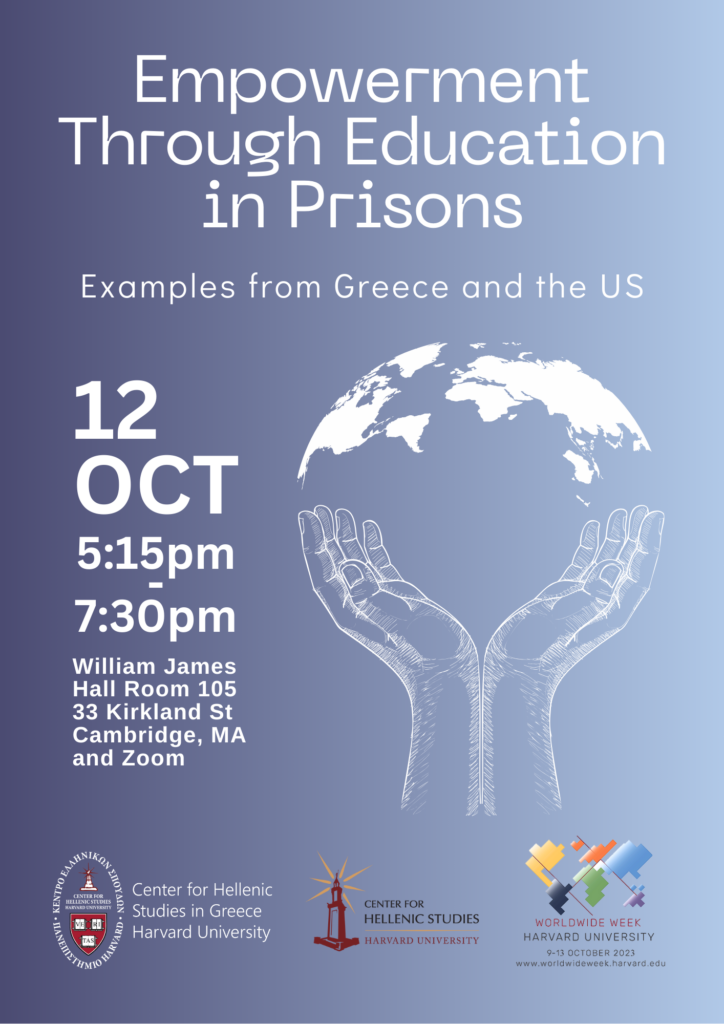Date: Thursday, October 12, 2023
Time: 5:15 p.m. – 7:30 p.m
Location: William James Hall, room 105, 33 Kirkland St, Cambridge, MA and Zoom.
This open roundtable discussion brings together different experiences and ideas on teaching humanities to residents within prisons, domestically and abroad. We will also hear the perspective of a re-entering citizen after decades behind bars. What can be done to improve education programs in prisons? Why are the humanities crucial now more than ever? How have these initiatives helped to empower the residents within these facilities? Join us to learn more and get involved in the development of the CHS prison education initiative.
This roundtable is part of Harvard University’s Worldwide Week programming, and done in collaboration with the Center for Hellenic Studies Greece. Click here to learn more and see the full week of programming.
About the Speakers
Emily Allen-Hornblower is Associate Professor of Classics at Rutgers University. She is a graduate of the École Normale Supérieure in Paris, France, and received her Ph.D in Classics from Harvard University. She is the author of From Agent to Spectator: Witnessing the Aftermath in Ancient Greek Epic and Tragedy (De Gruyter, 2016).
Her book and articles center on ancient (and modern) conceptions and portrayals of the human: the human condition and suffering; and factors of connection (and disconnection) between individuals and groups. In addition to her Rutgers teaching and scholarship, Allen-Hornblower has been teaching Classics and world history in medium and maximum security prisons in New Jersey since 2015, as part of NJSTEP (Scholarship and Transformative Education in Prisons).
Jessie Bates is a senior at Harvard College, studying Social Studies and English. She focuses on K12 education and inequality in the United States, and her thesis research is centered around the Lost Cause in the classroom. With a special interest in teaching at the elementary level, she spends a lot of time in K12 classrooms, from mentoring high schoolers to teaching fifth graders in summer school. She is joining our panel to share her experience volunteering at the Boston-based Prison Book Program, which fulfills incarcerated people’s requests for books.
Matina Goga is CHS Greece’s Curricular Development Manager. She studied Philosophy, Education, and Psychology at the University of Athens (UoA) her second degree was in Counseling and Guidance and her postgraduate studies in Career Counseling and Guidance, as well as in Strategic Human Resources Management. She has extensive experience in “Human Resources Development” European projects, in European Networks for Employability and Work, in teacher training programs, and in Family and Career Development Counseling. She has been trained and certified in various fields (e.g., Multicultural Counseling, Adult Education, Management, etc.), and volunteers in training programs, career coaching, and mentoring workshops.
Alkistis Kontoyianni, Emeritus Professor of Drama in Education at the Department of Theatre Studies, University of Peloponnese. She is the author of 38 books for children and educators about Drama, Puppetry, and Museum Education. She has participated in European research groups and has given lectures and workshops worldwide (England, Italy and Japan). Her last book is “Black Cow – White Cow, Drama and Intercultural Education”. Since 2014 her great interest and voluntary work has been education inside the prisons. She is the scientific director of more than 400 volunteers who work in four prisons, a project of life skills development (at Nafplio, Tiryns, Tripolis and Korydallos prisons.) Moreover, she is the editor of 18 books for education in prison, from the lessons in prisons, in which the 57 authors – researchers participated in (Aparsis Publications, 2022.) Her dog, Eros, takes part in all her activities.
Marquis McCray, is a native Mississippian bred on the inner-city streets of Newark, New Jersey during those panicked years from the mid 80s unto the early 90s. Marquis McCray is a Mass Incarceration survivor. Like so many peers of his day, this two-time felon is one of the multitudes whose mind was shaped by the myth of the “super predators.” Captured before arriving at adolescence’s end, he now struggles to overcome the social challenges of arrested development. He agrees with Lovelace’s assertion that ” Stone walls do not a prison make, /Nor iron bars a cage,” and wishes to remind us that more often than not, psychological prisons are constructed by the way one’s thinking is framed. He laments society’s lack of recognition of the importance of education in general – and particularly of the Humanities.
Adaner Usmani is an Assistant Professor of Sociology and Social Studies at Harvard University. He has taught social theory in programs at MA prisons through programs run by Emerson College and Tufts University.
Moderator
Caroline Stark, Associate Director of Academic Affairs, Center for Hellenic Studies. Associate Professor, Howard University.

